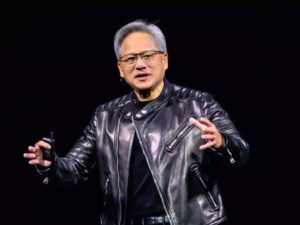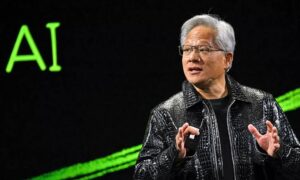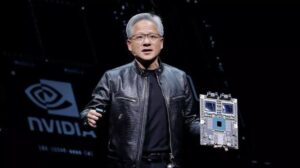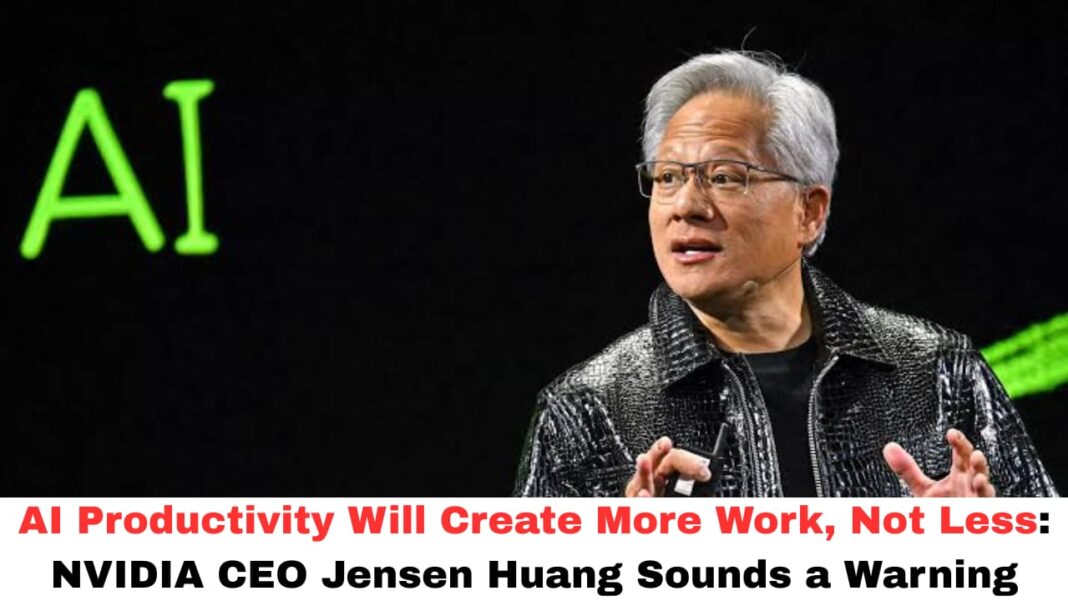Digital News Guru Technology Desk:
NVIDIA CEO Jensen Huang: AI perspective
The world is abuzz with the promise of artificial intelligence (AI) transforming work: freeing us from repetitive tasks, boosting productivity, and even paving the way for four-day workweeks. Yet, during a recent appearance on Fox Business Network’s The Claman Countdown, NVIDIA CEO Jensen Huang offered a sobering perspective. AI’s gains, he cautioned, may not lighten our burdens—they might deepen them.
“I have to admit that I’m afraid to say that we are going to be busier in the future than now,” Huang said, acknowledging that while AI accelerates task completion, it doesn’t necessarily grant us downtime. Instead, it often replaces one workload with a larger, more ambitious one. “You finish tasks faster, and that frees you up to take on more.”

From Seven Days to Four: How AI Could Reshape the Workweek
Huang drew a line from industrial revolutions of the past to our AI-driven future. Just as humanity moved from seven-day to five-day workweeks, today’s AI revolution could usher in a four-day model. But this isn’t a foregone conclusion—it depends on how societies and businesses adapt to productivity gains.
Indeed, real-world pilot programs offer promising insights. Studies in the UK and North America show four-day weeks can boost productivity by up to 24%, cut burnout in half, and slash staff turnover. In the Netherlands, where 32-hour workweeks are already prevalent, many organizations continue the model permanently.
Still, Huang’s caution looms large—efficiency gains may not equal rest. If companies keep pushing for more output, a shorter week could translate to crunchier workloads. “Most companies have more ideas than we know what to pursue,” he noted, highlighting the pressure to chase new innovations as soon as old tasks clear.
Job Transformation—Not Extinction
Huang is confident that AI won’t trigger mass unemployment—but it will radically reshape jobs. “Some jobs will go away. Many jobs will be new and invented. Every job will be changed as a result of AI,” he said, framing the AI era as a time of reinvention rather than collapse.
This optimistic outlook stands in contrast to more alarmist predictions. For instance, Anthropic’s CEO Dario Amodei suggests up to half of entry-level white-collar roles may vanish within five years. But Huang pushes back: if productivity only serves work already defined, then job cuts follow. But if it powers new projects and ideas—“and we have more ideas”—then productivity fuels growth, not shrinkage.

The AI Workplace: Adaptation Is Mandatory
Beyond macro trends, Huang emphasized a more personal truth: using AI is no longer optional. During a talk at a Washington DC summit, he warned: “‘You can’t raw dog it.’ If you’re not using AI, you’re going to lose your job to somebody who uses AI.” Every engineer and designer at NVIDIA, he noted, is already supported by AI tools that streamline creativity and innovation.
This reflection underscores a broader shift: AI isn’t just a tool—it’s an ecosystem. For professionals in tech and beyond, proficiency in AI will soon be as essential as mastery of the internet was decades ago.
A Future Where Leisure and Pressure Coexist
Let’s revisit the four-day week. In theory, AI could free us from drudgery and allow more time with family, travel, or contemplation. But emperors like Huang, famed for relentless work ethic, suggest leisure might remain elusive. And yet, Huang remains hopeful—drawing on historical precedent that widespread social shifts often follow disruptive technologies.
Herein lies a paradox: AI may bring both liberation and intensification. As tasks shrink and speed up, the boundary between productivity and pressure may blur. Companies could seize efficiency gains to push harder, or societies could choose to rebalance, emphasizing well-being over output.

What This Means for India
In India, where “hustle culture” persists and recent debates even include proposals for 70-hour workweeks, Huang’s caution is particularly relevant. While AI may support efficiency, social norms, economic necessities, and legal frameworks will dictate whether those gains translate into rest—or intensified labor.
Final Thoughts: AI as Amplifier, Not Equalizer—Unless We Choose It
Across industries and cultures, Huang’s message is clear: AI amplifies human agency—but it amplifies both opportunity and pressure. It can generate renewed ideas or unrelenting deadlines. Realizing its benefits hinges on how societies manage it—through policy, cultural shifts, and personal discipline.
As we stand on the brink of a new era, the promise of AI isn’t just technological. It’s human—and contingent on the choices we make.
You May Also Read: Tara Sutaria Makes Her Relationship with Veer Pahariya Instagram-Official During Ganesh Chaturthi








